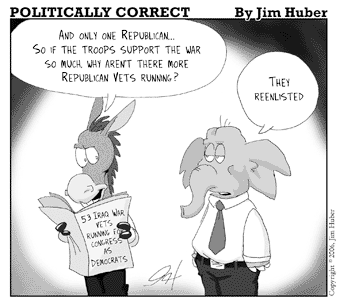
Traditionally, the Republican party has been known as the party of limited government and free-market capitalism. Today, this is little more than a myth. Per,
wikipedia (which is the ultimate source of populist/consensus history), "The party generally supports lower taxes and limited government in most economic areas allowing for more economic freedom... Compared with Democrats, many Republicans believe in a more robust version of federalism with greater limitations placed upon federal power and a larger role reserved for the States."
This sounds like a fair assessment of how most today would generalize the Republican party. The
2004 GOP Platform officially was written to outline what the party stands for. Upon reading the text, I was surprised when I didn't find a single declaration that specifically defends limited government or free market capitalism.
The closest to this sentiment was offered from our president George W. Bush:
"The role of government is not to control or dominate the lives of our citizens. The role of government is to help our citizens gain the time and the tools to make their own choices and improve their own lives. That’s why I will continue to work to usher in a new era of ownership and opportunity in America.”
Well, snide comments aside, the new 'era of ownership' is waning and our economy has entered a
recession. Many in the media have blamed the Republicans for this downturn on the grounds that they have allowed free-market capitalism to run amok. When asked about the stagnant economy, presidential candidate Barak Obama replied with
the following statement: "Our free market was never meant to be a free license to take whatever you can get, however you can get it.." Hillary Clinton called it: "Failure of oversight." Both clearly criticize the Bush administration for lack of government oversight.
The unspoken truth is that the Bush administration never supported free market capitalism. In fact, the administration has ushered in new regulations at a near record pace. Many have argued that the rights of business owners were far greater before Bush took office.
As the
Heritage Foundation points out:
"Compared to the 74 rule changes that increased regulatory costs, only 23 rule changes reduced burdens. In other words, for every case in which regulators reduced a burden, they increased burdens over three times."
Let's take a look at some sweeping regulations have taken effect under George Bush's regime:
Sarbanes-Oxley Act: These accounting regulations have reportedly
sunk 500 companies, failed to
prevent further scandals, created
barriers to entry, hurt
wall street, only succeeding to allocate more power to
the state.Energy Regulations:
Bush continues to trumpet
ethanol production as a solution to the nation's energy crisis. The failed policy (except of course on political grounds) has led to higher food prices and has been
widely criticized.Banking Regulations: When the banks faced the bursting of the housing bubble/mortgage crisis, they decided to make a deal. They would be bailed out by the government in exchange for increased
regulation. The terms of the regulations have not been finalized or disclosed. There are fears that legislation may give the federal reserve free reign over the banking industry, creating in essence, one nationalized bank.
Beyond these three, there are countless examples of heightened bureaucracy and regulation under George W. Bush. Two of many that allocate power to the executive branch are the new regulations on
Military Lawyers and
federal rules and policy statementsThe administration has also moved to even further regulate
the energy industry and has unexpectedly passed America's first national legislation to
Regulate Greenhouse Gases.
It is interesting that Bush, who regulated the economy as much, if not more than
Bill Clinton, gets labeled as a free-market president. As Americans, we see both parties pushing for more regulations and government control, while the average citizen struggles.
History has shown that the free market is the best tool of maximizing the standard of living for people, but sadly that is no longer an option in America.







